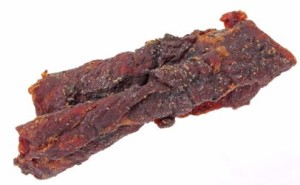Food Safety Talk, a bi-weekly podcast for food safety nerds, by food safety nerds. The podcast is hosted by Ben Chapman and barfblog contributor Don Schaffner, Extension Specialist in Food Science and Professor at Rutgers University. Every two weeks or so, Ben and Don get together virtually and talk for about an hour. They talk about what’s on their minds or in the news regarding food safety, and popular culture. They strive to be relevant, funny and informative — sometimes they succeed. You can download the audio recordings right from the website, or subscribe using iTunes.
Don and Ben start the show by talking about the drastic weather in Raleigh, NC and Freehold, NJ. They quickly changed topics to beverage preferences, including Starbucks and eggnog. Ben notes he is not a fan of eggnog although his grandparents used to drink consistently. Ben also reminisces about other old-timey eating habits including pickled beets, and buttermilk. Don will stick with eggnog plus whiskey during the holiday season. Ben shared his excitement about a Sloan concert that he recently attended with his wife. Ben also mentioned a thoughtful gift that he received from his wife: a poet (Matthew) wrote a poem for Ben on the topic of barf and Ben was very thrilled. Don also shared his excitement as well as he recently celebrated his birthday, and Merlin gave him a shout out on his podcast.
Twenty minutes in, food safety talk officially began and Ben commented on a blog post where the interviewed the research chief of ABC Research laboratories. She was interviewed about raw honey and recommended honey pasteurization to prevent infant botulism. Ben disagreed with her statement, and noted that pasteurization does not destroy the spores present in honey. Don supported Ben and added that pasteurization is even less effective in low water activity foods like peanut butter or honey. According to this fact sheet, honey is pasteurized to reduce the likelihood of fermentation and crystallization over time.
Don turned the topic to Ebola in the US, and mentioned Peter Sandman’s post on The public health establishment and the quarantine debate. Sandman complained about how the US handled the Ebola issue. Ben agreed with some (not all) of the post and concluded that risk talk should always be frank.
From Ebola the topic turned to Hepatitis E as an emerging foodborne disease. A UK article stated, 1 in 10 sausage carries the risk of Hepatitis E, which seems high to Ben and Don. Don thought that Hepatitis E in the UK might be a worker sanitation issue. Both guys were intrigued by the apparent low risk of Hepatitis E in the US. Peer reviewed research published in Epidemiology and Infection states that Hepatitis E is associated with unprocessed sausage, and 90% of British pigs have exposed to Hepatitis E and produce antibodies. Cooking suggestion including cooking for 20 min at 70 °C or better yet, using a thermometer.
Don mentioned a recent contact by a local company asking about safe practices for cooked brown rice preparation. Although the company had a detailed and meticulous workflow, additional information (like product time and temperature) would be needed to insure control of Bacillus cereus, according to Ben.
The show concluded with talk about the Month-Long Poop Cruise, the verdict in the Peanut Corporation of America case and the food safety mess in Pro Sports.









 said. “But the cheese-eating French aren’t dropping like flies, which made our laws look increasingly out of touch.”
said. “But the cheese-eating French aren’t dropping like flies, which made our laws look increasingly out of touch.”